
Where do you seek information about politics and elections? Have your sources changed over time? In this roundtable, three faculty in the UW Department of Communication — Adrienne Russell, Matthew Powers, and Patricia Moy — talk with Perspectives editor Nancy Joseph about the role of media in creating an informed public. Russell and Powers are co-directors of the UW Center for Journalism, Media & Democracy (CJMD). Moy is a CJMD senior research fellow.
Let’s start by discussing changes in the media landscape over the past few decades.
Adrienne Russell, Mary Laird Professor of Communication: The media landscape has radically changed. Before the early 2000s, people generally relied on a narrow set of news outlets to get their news — three television news networks, a daily newspaper or radio news show, maybe a weekly magazine. News was professionally produced and reported from the perspective of people in positions of authority. Today we have so many options, not only to access news but also to post, comment, share, and opine on news events and on coverage of those events. Algorithms fill our newsfeeds with content they predict we’ll click on. And we can curate our own news flows by subscribing to newsletters, following people and organizations, and engaging conversations of interest to us.
Is this a positive or negative change?
Russell: It's both. Some people seek out a lot of different perspectives and high-quality information. But more often than not, people seek out sources that reflect their already existing beliefs, and they gravitate to extreme content. Recommendation-algorithms and other forms of AI create an architecture of persuasion. If you view a climate video that includes the point of view of climate deniers, for example, you will get recommendations for similar videos in increasingly extremist forms.
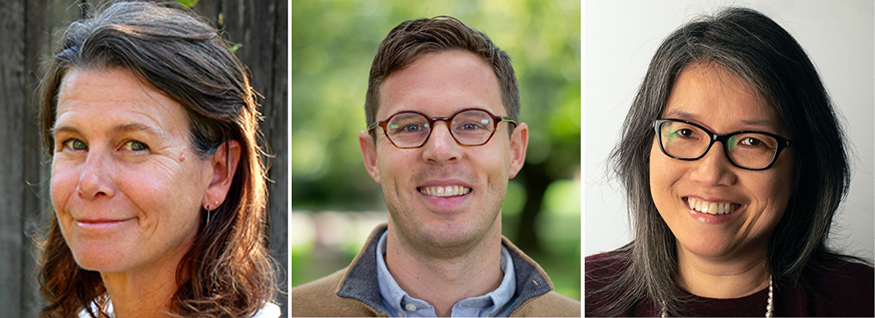
Is the tendency to seek sources that reflect our existing beliefs a recent development?
Matthew Powers, associate professor of communication: One of the earliest scholars of mass media in the 1940s and 1950s, Paul Lazarsfeld, came up with this idea of the reinforcement of prior dispositions. Then as now, there were debates about what media are doing to people. A basic finding he established with colleagues was that, for the most part, media doesn't inculcate new views. It reinforces existing ones. To some degree we're having the same conversation now, just in very different media environments.
Patricia Moy, Christy Cressey Professor of Communication: Along those lines, in terms of how individuals process information, people can be cognitive misers. We don’t turn to 18 different sources when one or two will suffice. We gravitate towards sources that resonate with our views, sources we trust to not jar us first thing in the morning. When we do see information that might be slightly dissonant, we end up engaging in what scholars call “motivated reasoning.”
Can you explain that a bit more?
Moy: We’re all in the business of uncertainty reduction, trying to make sense of the world around us. When we encounter contradictory information, sometimes we’re driven to figure out which piece of information is correct or more accurate. Other times, we’re motivated to seek out or process information that bolsters our own opinions. In our highly fragmented media landscape, it’s very easy to find information sources that align with our views — and avoid sources that do not. In other words, we tend to process that information in a way that fits into our mental model of how the world operates or should operate.
We don't turn to 18 different sources when one or two will suffice. We gravitate towards sources that resonate with our views, sources we trust to not jar us first thing in the morning.
Has the fragmentation of media contributed to our polarized political climate?
Russell: I think we can look at fragmentation as related to an increase in specialization — for example, people who want to keep up with climate news have an array of high-quality niche climate news outlets to choose from. But fragmentation can, of course, be negative. If we inhabit vastly different media spheres, we in some ways also inhabit different realities in terms of content and epistemologies — what we value, who we trust, how we know things, and what we believe.

Moy: I agree that people turning to starkly different sources of information is problematic if we expect them to think about and engage with the same issues. There has to be a sufficient level of consensus for decision making and deliberation. If people are turning to really different sources of information, can we be guaranteed that level of consensus?
Are there things the media can do to encourage consensus and participation in the political process?
Moy: What it means to engage in politics has shifted over the decades. What used to be traditional acts of participation — voting, giving money, writing letters to the editor, calling in to a radio station, signing a petition — were not necessarily equally distributed across the citizenry. But now with information technologies, people are able to give small amounts of money online. People can comment on articles they read online or post on social media. There are ways to engage in politics that people might not have considered engagement in the past. These additional ways to engage make people feel involved, but they also generate lots of noise.
Powers: There are also a fair number of people who consume almost zero political news, whose main way of relating to politics is simply to abstain from it. We have an information environment now where that's more possible than before. People can come home and watch anything they want without being bothered with the evening news.
Do you have a sense of why people are abstaining? Could journalists do more to encourage participation?
Powers: In terms of people who are not participating, they may no longer see politics as a vehicle for changing the world for the better. Journalists have to deal with that reality, but they did not create it. There’s a bigger issue with the world of politics that I don't think journalists on their own are capable of fixing. I think political problems require political solutions just as journalistic problems require journalistic solutions.
There’s a bigger issue with the world of politics that I don't think journalists on their own are capable of fixing. I think political problems require political solutions just as journalistic problems require journalistic solutions.
Are journalists in other countries facing the same challenges?
Powers: The US isn't the only place where broad swaths of the citizenry feel disaffected by politics. News media around the world face the problem. But there are some differences in political journalism. The US tends to be much more “horse-race” focused — who’s ahead in polls, that sort of thing — while Western Europe covers more analysis of policy. Also, because of the strength of public service broadcasting historically in many Western European countries, there's a fair number of mass media that, by mandate, must report on election issues, reaching larger segments of the audience. So that's an important difference. But in a lot of ways, they're facing the same problems.
Another growing concern is disinformation. Adrienne, your new book focuses on climate journalism, including the challenges of battling rampant disinformation. How big a problem is that?
Russell: Disinformation and attacks on climates scientists, journalists, and activists online and offline are a huge problem. And it’s important to note that this noise and abuse thrives in part because of the liberal tradition under which these platforms operate. This tradition champions the rights of individuals to speak — no matter how loud or toxic their message — over the collective right to hear one another and gain the benefit of a rich diversity of perspectives and voices.
Is there a way to curb disinformation and toxic communication without trampling individual rights?
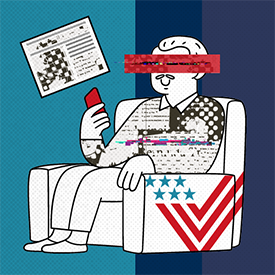
Russell: There is a premise that regulation, particularly around content, is unnecessary because the marketplace of ideas will ensure that quality information will emerge and gain widespread acceptance. By extension, this view advocates a hands-off approach to media regulation. But clearly the best quality information is not rising to the top. Our digital space is the way it is because unregulated businesses made it that way. If we step back for just a minute, can’t we imagine a better kind of communication space than the one now served up by digital giants Meta and Google and X, and so on? Is a “public option” digital space, for example—one that prioritizes solid information and civil discourse over profits—that difficult to imagine building and maintaining?
That’s a fair question. What would it take for that sort of change to happen?
Russell: As long as both media and politics are driven by financial interests, any changes will be superficial. The internet is where we conduct the vast majority of public discussion, and the way the internet is now — defined by the predominant business-model need for clicks, the push toward anger and extremism and agitation, the information silo-ing — all of that puts great hurdles up to discussion, which makes it very difficult in a democracy to problem-solve. We have to take our digital technologies to a next stage that better serves the public interest.
More broadly, do you see any big changes on the horizon for media in relation to politics?
Powers: I think the relationship has changed and will continue changing. Politicians still engage with the press in various ways, but if they want to reach a large segment of the population, they often find it just as easy to do that by going on an entertainment podcast or posting to social media rather than facing the more serious questions that they might get from a hostile independent press. Journalists are adapting simply by focusing less on the one-on-one interview “gotcha” moment with politicians and doing more deep-dive documentary analysis. On the other hand, politicians will claim very reasonably that they're going where the audiences are, because the audience for “The View” or a popular podcast is larger than what the evening news gets. But it's also a way of shielding themselves from critical scrutiny, and, for some, to spread misinformation.
As long as both media and politics are driven by financial interests, any changes will be superficial. ...We have to take our digital technologies to a next stage that better serves the public interest.
Moy: I completely agree. As technologies allow politicians and elites to communicate directly to their constituents and to potential voters, they have the opportunity to frame themselves in ways they perceive to be most effective in achieving their political goals. They appear on talk shows or podcasts and create a persona instead of fielding difficult questions from a press corps -- questions that might put them on the spot and box them into a specific stance. You can't separate politics from the media, but the interplay between the two entities has changed.
What advice do you have for people wanting to educate themselves as participants in the political process?
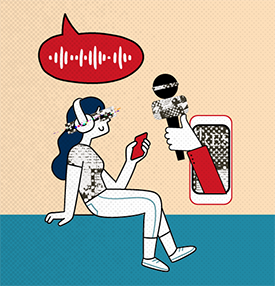
Moy: Being part of the political process means understanding — or trying to understand — more than what one personally thinks or feels. Tapping into multiple sources of information, particularly those that offer different or new information, allows us to get a sense of how others feel and think. This understanding ultimately can help us arrive at some reasoned understanding of an issue. Of course, exposing ourselves to different views isn’t easy, especially when we’re dealing with information overload, misinformation, and the algorithms and curation Adrienne mentioned earlier. But even something as simple as reading letters to the editors, written not by elites but by citizens, can be illuminating.
Russell: I would add that voting is good — it’s a must — but also, do more. In the climate movement, activists, scientists, and journalists are doing the bulk of the work. But increasingly we are seeing Amazon workers staging protests against that company’s environmental impacts; advertising creatives refusing to work with climate polluters; students working and succeeding all over the country at getting their universities to divest from fossil fuel. Politics is not just what happens in government. It’s about all of the ways we work to make this the sort of world we want to live in.
Powers: I agree with what Patricia and Adrienne said, with the caveat that we shouldn't ask citizens to be more active in a political process without asking why they are so inactive in the first place. Given that we have a political process with gerrymandering and backdoor deals happening, it's not an entirely irrational response for people to just tune out. And so I would like to see, in addition to all the things we've talked about here, a political system with leaders who respect citizens enough to bring them into the process so that they can be democratic participants. People need reasons and incentives to participate in the political process.
More Stories
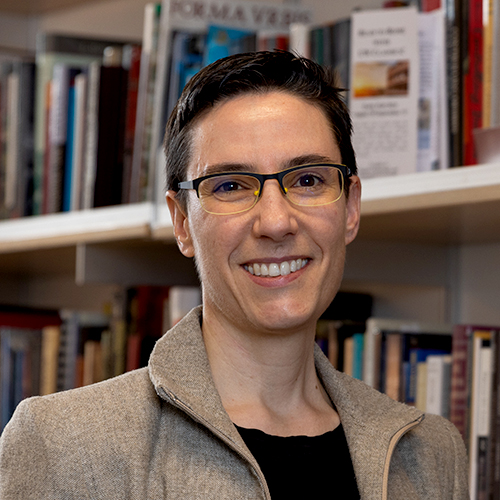
Lifting Marginalized Voices — from Ancient Rome
"Interesting, frustrating, and necessary,” is how Sarah Levin-Richardson, professor of Classics, describes her research into the lives of enslaved individuals in the ancient world.
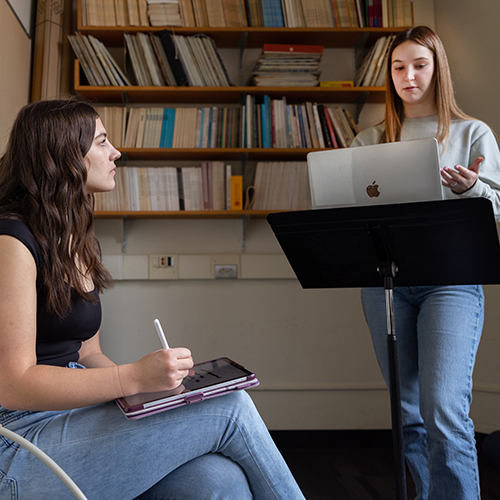
The Truth About Public Speaking
Becoming an effective public speaker requires planning and practice. Professor Matt McGarrity and consultants at the UW Center for Speech & Debate are available to help.
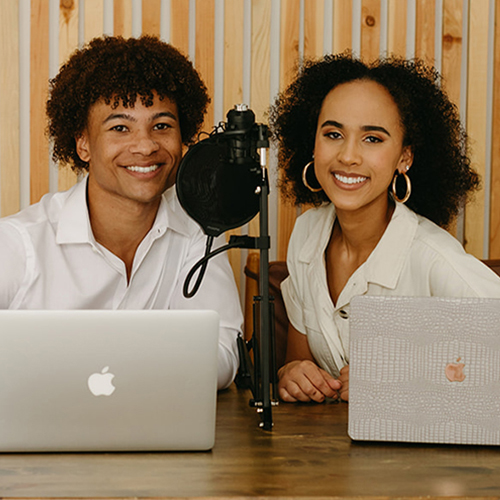
Mentorship for Black Professionals, Earbuds Not Included
Identity Unboxed, a podcast created by alums Tiana Cole and Brad Blackburn III, explores the experiences of Black professionals in the Seattle area.
